Choosing the best Linux web hosting provider can be daunting since numerous options exist. Do you wonder why? Linux web hosting is the most common type, and almost every host uses the operating system.
This creates a long list of hosting providers to weed out since they don’t provide the same level of performance and quality. But how do we choose the best hosting provider for Linux services?
We have eased you of the burden by testing several top Linux web hosting providers in 2025. This page contains the Linux providers that have excelled in our tests and reviews. Thus, you can choose your favorite host for your business or website from them.
Five Best Linux Hosting Services: At a Glance
- Hostinger – the best Linux hosting overall
- SiteGround – best for speed and ease of use
- InMotion Hosting – the best cheap Linux hosting
- Hosting.com – fast Linux-based servers
- DreamHost – best for WordPress sites
What Is Linux Hosting?
Linux web hosting refers to running websites, web applications, etc., on a server using Linux as its operating system. As we said earlier, it is the most common type of hosting because it offers great performance in all important aspects. Linux web hosting provides great stability, reliability, scalability, and security.
Besides, it is cost-effective because it is open-source and lets hosting providers configure affordable plans.
What’s more, Linux web hosting is highly used by hosts due to its support or compatibility with many software, programming & scripting languages, control panels, etc. It makes hosting all sorts of online projects possible and easy.
Therefore, Linux web hosting is the most recommended type to host any website or web application that needs great security, stability, performance, scalability, etc. Besides, Content Management Systems (CMS) like WordPress, Drupal, Joomla, etc., that use PHP work best on Linux servers.
However, one should note that the best web hosting services in 2025 do not use the same Linux servers. Each host has a particular Linux server (OS) tuned to create a perfect environment for sites and web applications. Some of our top Linux web hosting providers use Debian, CentOS, Ubuntu, Red Hat, and Fedora.
Extra: One of the reasons why Linux hosting is better than Windows hosting is that the former supports more technologies since it is open-source. Thus, you can run many programs on a Linux server. On the other hand, Windows is a closed-source operating system that lets you use mostly Microsoft-specific programs or technologies.
How to Pick The Best Linux Web Host
Choosing the best Linux web hosting service in 2025 depends on many factors. However, not all factors are essential to every business in the same way. While some factors significantly impact the success of your site or any web application, others may be less important.
But that doesn’t mean they shouldn’t be excellent.
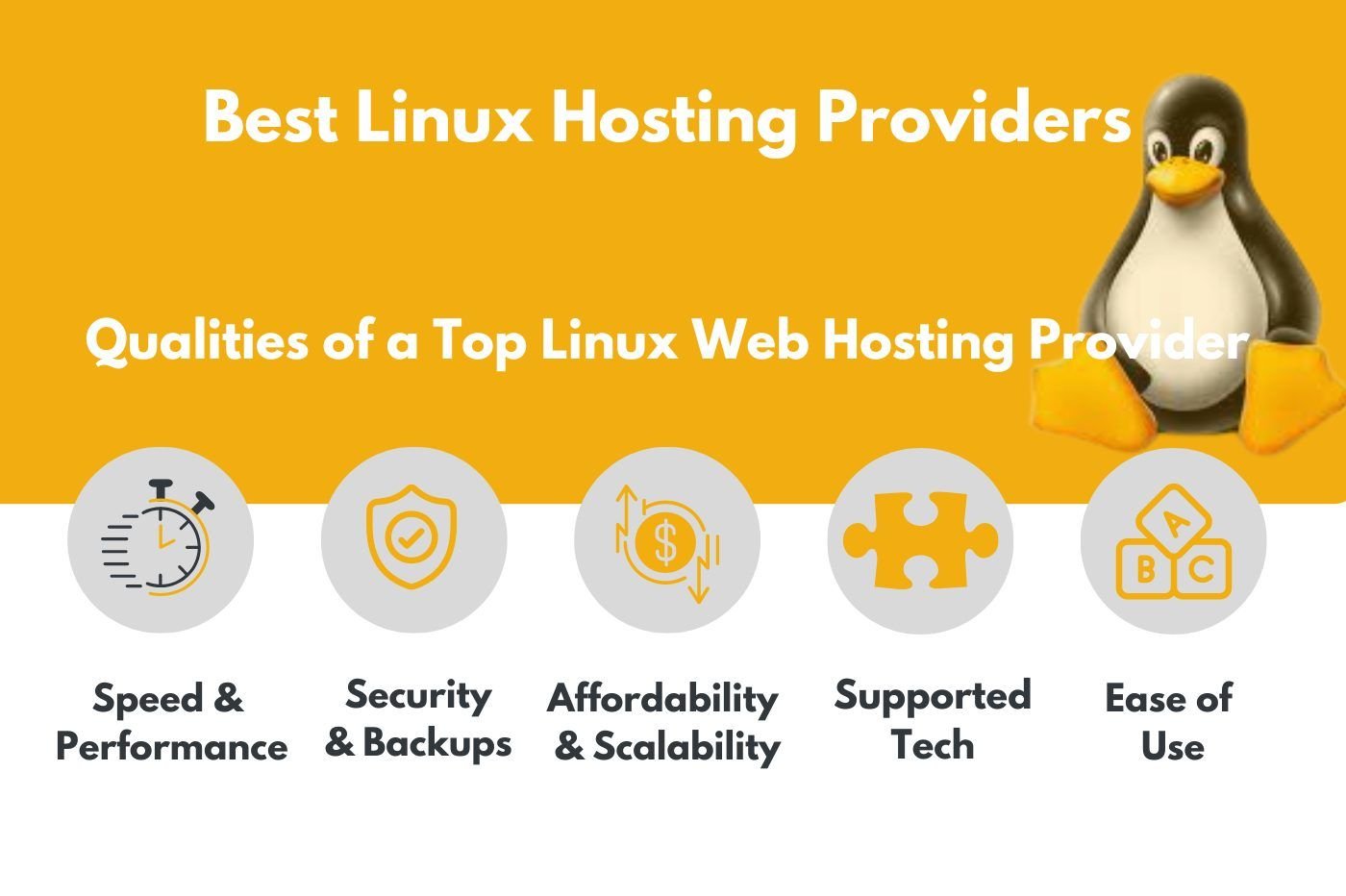
Hence, picking the best Linux web hosting service depends on what you need for your business. Ideally, you should choose a host that has at least 99% of what your business needs to thrive. Otherwise, it would be a waste of time and investment.
Pricing & Availability of Hosting Types (Scalability)
Pricing is the first factor when choosing the best Linux web hosting services.
As we said earlier, Linux web hosting is relatively cheap because it is open source, and hosts don’t pay for the software. Thus, they should be able to provide affordable Linux servers that won’t make a website owner break the bank. Most hosts provide other features that may justify the hike in prices, and that’s totally acceptable.
But if the features are standard/minimum and still pricey, you should shop elsewhere.
Another factor determining which Linux hosting provider you should pick is the resources you need for your website. The top web hosts generally provide four types of Linux server hosting to their customers based on their project needs. They are shared, VPS, cloud, and dedicated server hosting.
Now, let’s dive into what these hosting types entail.
- Linux Shared Hosting: Here, you will share your server resources with many users. Therefore, you will pay less to use the server and get basic performance. This type of hosting is great for personal blogs, landing pages, sites with little traffic, or school projects.
- Linux VPS Hosting: This is similar to shared hosting, but it is a little better. Here, even though you will use the same server as other users, you will have dedicated or isolated resources. That is, the host will create a virtual server using the resources of a much larger server for you. As a result, the website or project will perform better on such a server. This is more expensive and can handle bigger projects.
- Linux Cloud Hosting: In cloud hosting, you can get even better performance than what the VPS offers. Here, web hosting providers use the resources of interconnected servers to host your website or web application. Therefore, your data will be almost everywhere, and your website will record a great performance, especially in loading speed and uptime. However, like VPS, you will be limited in the resources, such as RAM, CPU cores, etc., that you purchase. Nonetheless, cloud hosting offers high scalability that lets you increase your resources easily.
- Linux Dedicated Server Hosting: This is the last Linux web hosting type. A hosting company provides a physical server specifically for your website or business. All the resources of this server will be available only to you. This hosting type is recommended for business organizations, startups, or even web developers who host sites for clients. It ensures that you get the best performance out of your Linux server.
Generally, we advise that you choose a host with many powerful servers, even if you don’t need them now. This makes it easy for you to scale when your website grows and you need more resources.
Performance, Security & Compatibility
Performance should also be considered when choosing your favorite Linux web hosting service in 2025. Regardless of the hosting type you choose or how cheap your server is, your website’s performance should be top-notch. Here, we refer to uptime, website loading speed, server response times during peak hours, etc.
If the server does not meet the performance requirements of your website project, then it is best to choose another one. Furthermore, it is important to ensure that your host provides adequate security for your servers.
Since one of the main reasons to use Linux servers is that they are highly secure, it is relatively easy to improve this aspect as well. Many web hosts provide additional security measures, such as anti-DDoS attack protection, brute force protection, firewalls, etc., to make your server or site a Fort Knox.
In conclusion, before you choose a Linux web hosting service, you should ensure that it has the features that made you want Linux in the first place. Some of these features include support for scripting & programming languages like Python, PHP, Perl, JavaScript, Ruby, HTML, CSS, etc., or databases like MySQL, PostgreSQL, and MariaDB.
5 Best Linux Web Hosting Services in 2025
Now that you understand Linux web hosting, let’s examine our top five hosts and see what they offer.
1. Hostinger – Overall Best Linux Web Hosting Service
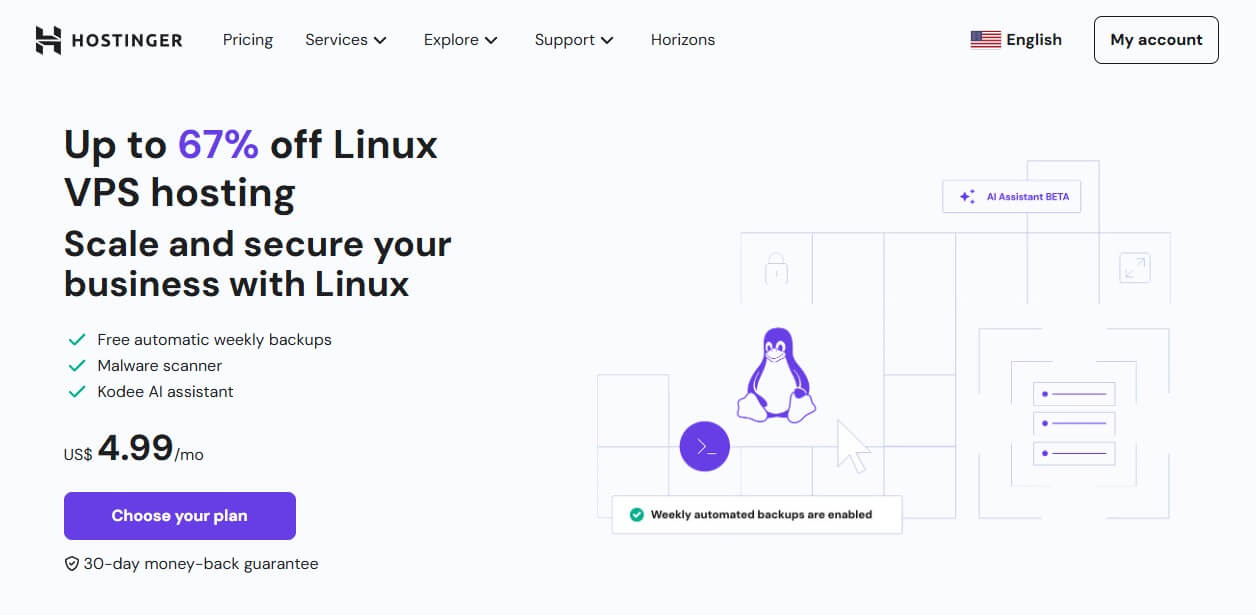
Hostinger is the best Linux web hosting service to trust in 2025. This Lithuanian-based host has proven to deliver amazing services through outstanding features, great performance, unmatched ease of use, and 24/7 expert customer support. In addition to all these, it is still one of the best cheap web hosts for Linux.
Hostinger’s plans cost as low as $2.99 per month, and you will get even better discounts when you purchase a plan with this Hostinger coupon. The packages have so many features that they offer the best value for money.
This is amazing because many web hosts generally increase their prices or sell add-ons when providing the features Hostinger gives for free.
Furthermore, Hostinger has shared, cloud, and VPS hosting services running on Linux. This allows you to move from one hosting type easily if your website ever needs a more powerful server. It is great if you have a website that will need the scaling of server resources from time to time.
The best thing about scaling your business website with Hostinger is that it is very affordable. Let’s look at the price of each hosting type and its features:
- Shared hosting: This is the cheapest hosting type, and the pricing ranges between $2.99 and $3.99 monthly. It is great for a website that drives moderate traffic. Businesses with few landing pages or a small website can get the best performance from this category. You can host between 25 and 50 websites on this hosting type, get automated backups, and up to 50 GB NVMe SSD storage space. They all have unlimited bandwidth as well.
- VPS hosting: This is a better alternative to shared hosting if you have a more resource-demanding website. The servers cost between $4.99 and $19.99 per month. These plans give you full root access to your servers, dedicated IP addresses, Snapshots, 50 GB to 4000 GB storage space, 4 GB to 32 GB RAM, 1 core to 8 core vCPU, etc.
- Cloud hosting: Cloud hosting plans cost between $7.99 and $29.99 monthly, and they are more powerful than shared and VPS hosting. The least powerful server configuration (Cloud Startup), which costs $7.99 monthly, has 3 GB RAM, two CPU cores, and 100 GB storage. At the same time, the most powerful configuration, Cloud Enterprise, which costs $29.99 per month, has a 300 GB NVMe SSD, 12 GB RAM, and six CPU cores. The plans all have a dedicated IP address, free CDN, free email hosting, staging tools, unlimited bandwidth, etc. These servers are great for startups, business websites, busy blogs, etc.
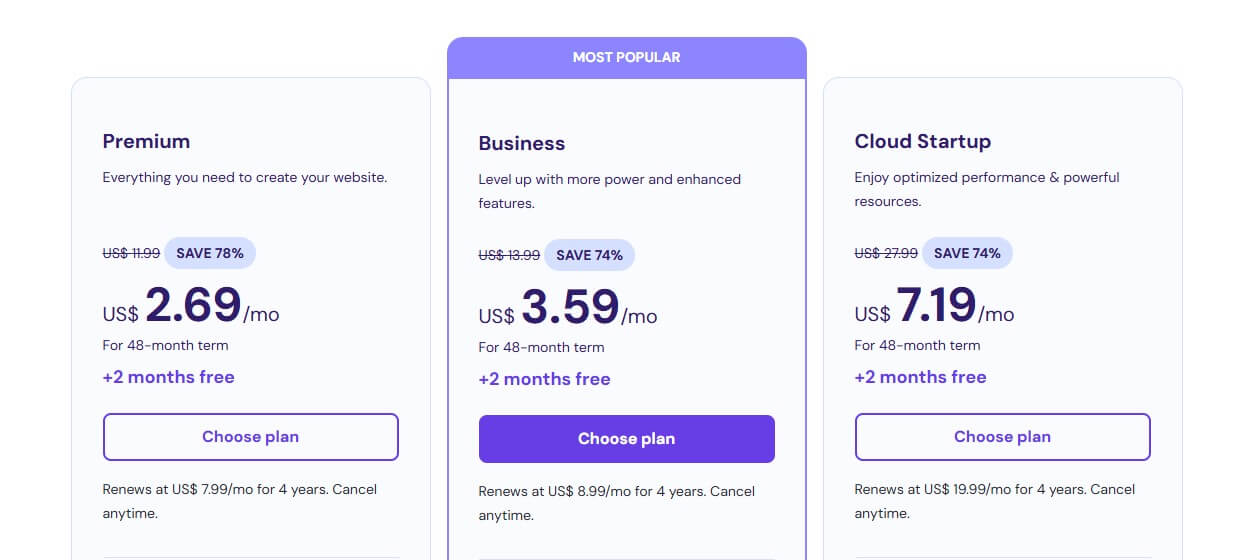
If you are ever unsatisfied with your hosting plan, Hostinger offers a 30-day money-back guarantee with no questions asked. For more details, see our full breakdown of Hostinger plans and pricing.
Performance and Security
According to our tests, Hostinger is one of the best Linux web hosting services in terms of performance and security.
Hostinger uses LiteSpeed web servers on its hosting plans. LiteSpeed servers usually have high processing and loading speeds and perform at the highest level. Therefore, your website at Hostinger will load very fast without issues.
The web host still uses advanced technologies such as NVMe SSD, RAID-10 storage, and advanced caching to speed up your website. Moreover, Hostinger has nine data centers worldwide and lets businesses choose where they want to host their site.
What’s more, you can change your data center location for free once every 30 days. This allows you to deliver the best loading speeds to your visitors, depending on their location, and excel in SEO. After running our tests with Hostinger, we discovered that the host performed exceptionally among our top Linux web hosting services in 2025.
Our tests show that Hostinger can load a web page on its standard performance servers in only 769 ms. This means if you host your website on more optimized servers on packages like Shared Business or Cloud Startup, you can record even lower loading speeds. Therefore, your site will be set for great SEO performance.
What’s more, our findings show that Hostinger servers can withstand high traffic or traffic surges irrespective of how cheap your plan is. Upon testing the response times of Hostinger’s standard server on the Premium package, we recorded an average response time of 47 ms for 1000 visitors.
This shows that even with shared hosting packages, you can host a traffic-heavy site without issues. Moreover, Hostinger maintains an uptime of 99.997%, which is better than its 99.90% guarantee. Furthermore, our investigations of Hostinger’s security revealed that the host makes your website a Fort Knox.
Hostinger provides free SSL certificates, SSH access, automated backups, a malware scanner, DDoS protection, and web application firewalls on all its hosting plans for free. This ensures that your website is protected out of the box, and you won’t need to make too much extra effort on security.
Discover Hostinger Hosting Plans
Supported Technologies
Hostinger supports many Linux-based operating systems, such as CentOS, Ubuntu, Debian, AlmaLinux, and Rocky Linux. It also supports programming and scripting languages, such as PHP, Python, Perl, JavaScript, HTML, CSS, etc. It also supports the integration of Git for project or repository deployment.
In addition, it supports only MySQL databases on its servers. This database integrates perfectly with PHP, and you can easily manage it using phpMyAdmin. In conclusion, Hostinger supports using cPanel to manage your server and install applications on it.
However, cPanel is not supported on its shared and cloud hosting plans since it uses a proprietary control panel (hPanel) that is better and more intuitive. Therefore, you will have to either get a VPS or purchase one of its special cPanel hosting packages to use cPanel.
2. SiteGround – Best Linux Web Hosting for Security and Ease of Management

Another top Linux web hosting service to trust in 2025 is SiteGround. It is a great host that excels mostly in customer service, security, performance, and ease of management.
Even though it is a Bulgarian company, SiteGround delivers top performance and knocks off great competitors worldwide. In fact, it is recommended by WordPress.org as one of the best WordPress hosting services to use.
SiteGround has a lot of custom features when it comes to performance, security, and ease of management, and offers them on all of its hosting packages. This means that you won’t have to pay for add-ons to use the excellent and unique features of the host.
However, because of this, SiteGround does not offer many discounts on its hosting plans after the initial year. So, it is more advisable to use SiteGround when running a profitable website rather than a fun or leisure project.
Our investigations revealed that SiteGround delivers top Linux web hosting services in only the shared and cloud hosting categories. Even though there is no VPS or dedicated server hosting, the scalability that comes with the cloud services makes the host a perfect choice.
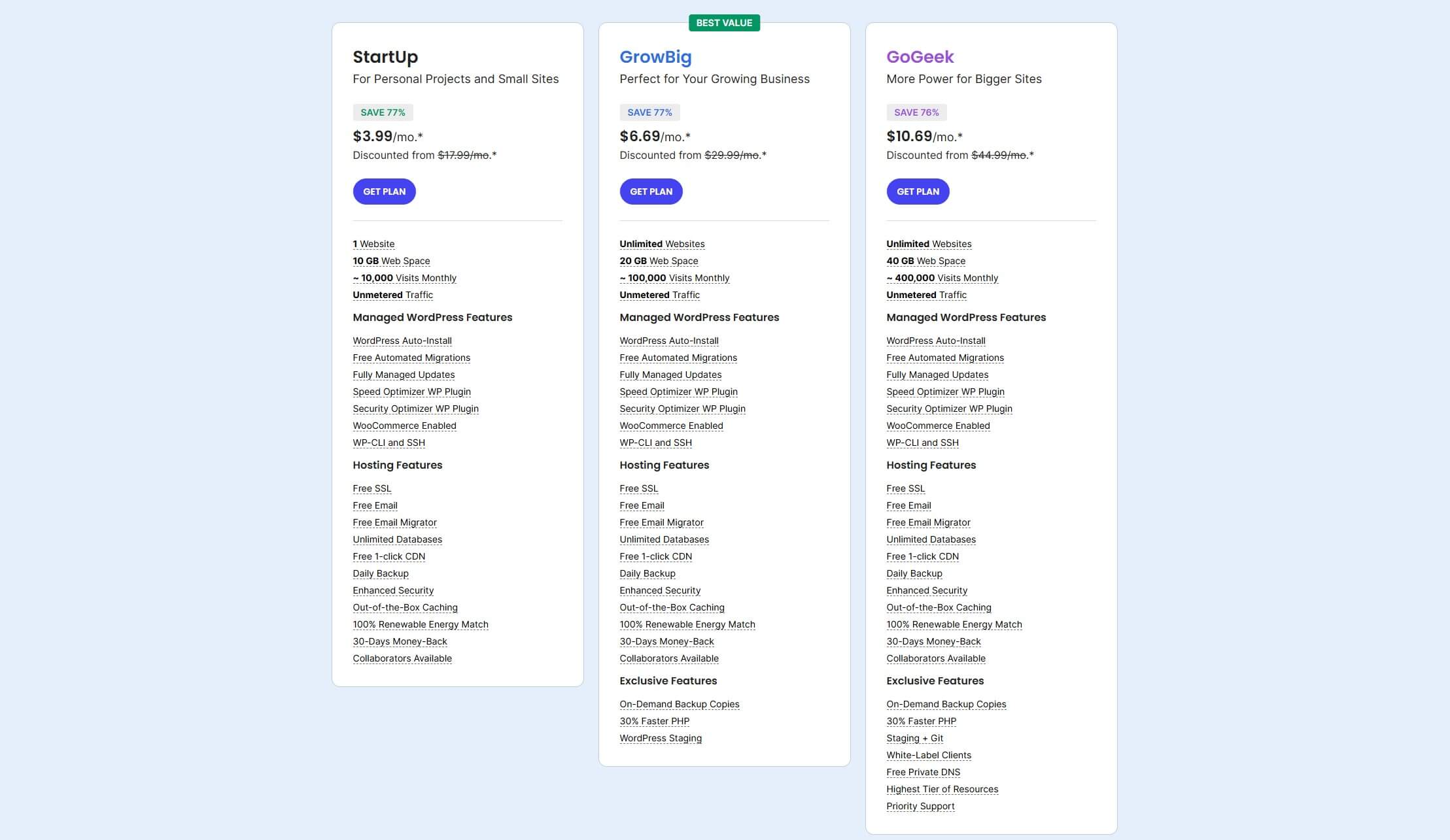
Here is a quick look at some Linux hosting plans on SiteGround and their major features:
- StartUp costs about $3.99 per month and renews at $17.99 per month. It has 10 GB of storage and a capacity of at least 10,000 monthly visits. It can also host only one website, which is suitable for a site with a substantial amount of traffic.
- GrowBig costs about $6.69 per month; it renews at $29.99 per month. It can host unlimited websites with 20 GB of storage space. It has a 30% faster PHP, staging websites, and at least 100,000 monthly visits capacity. This server can handle blogs and small business websites with thousands of visitors daily.
- GoGeek costs about $10.69 per month; it renews at $44.99 monthly. It has 40 GB of storage and can handle at least 400,000 monthly visitors. Aside from GrowBig features, it has Git integration, white-label clients, free private DNS, the highest tier of resources, and priority support. The plan is great for developers, SEO agencies, web designers, etc.
- Cloud: costs $100+ monthly. These servers are highly flexible and allow scalability. You can configure a server with up to 33 cores, 130 GB of RAM, and 1 TB of SSD storage. These plans are best for startups, established websites, hosting resellers, etc.
Some of the main features that all plans have are free email hosting, unlimited bandwidth, free CDN, free email migrator, unlimited databases, out-of-the-box caching, etc.
Performance & Security
The next aspects where SiteGround excels as one of the best Linux web hosting services are performance and security.
As mentioned earlier, SiteGround has many custom technologies and features. To begin with, the host created custom MySQL databases and PHP that are faster than the standard. This allows their servers to handle processes faster while using fewer resources without issues.
It also uses advanced optimization technologies, such as Brotli compression, SSD storage, Nginx caching, OCSP Stabbing, HTTP/2, etc., to increase the servers’ performance. In addition, the host has 11 data centers, 16 CDNs, and 170 Google Cloud CDN Edge Networks worldwide.
This allows you to choose the closest data center to your main audience and deliver the fastest loading speed possible. At the same time, if your target audience changes, you can move your site to another data center at a fee.
Because of these technologies, we performed performance tests in our SiteGround review for 2025. Upon testing, we discovered that a website on SiteGround can load in as little as 731 ms. If you host in your audience’s exact country or continent or use SiteGround’s CDN, you can get a breakneck loading speed of 497 ms.
Host Your Site With SiteGround
Our further investigations show that SiteGround servers can handle huge traffic without breaking down, as we recorded an average response time of 143 ms for 1000 visitors in one minute. The host also maintains a 99.998% uptime.
Further, SiteGround provides commercial-grade security on all its hosting packages. It offers free DDoS protection, automated backups, firewalls, an AI anti-bot system for brute force attacks, and a WP security plugin. It also uses RAID-10 technology and geo-distributed backups to safeguard your site files and data.
Supported Technologies
SiteGround’s hosting plans use only Fedora Linux as the primary operating system. It does not support cPanel but offers unlimited MySQL databases, phpMyAdmin integration, and a better control panel (Site Tools).
At the same time, SiteGround supports many programming & scripting languages like Python, PHP, Ruby on Rails, JS, CSS, etc. Of course, you can easily deploy the Git repository from Site Tools to your site.
3. InMotion Hosting – Best Cheap Linux Web Host for Media-heavy Websites

InMotion is a solid pick in our list of the best Linux web hosting services in 2025. This is a very impressive web host, especially regarding performance, storage allocation, and affordability. InMotion provides reliable Linux web hosting services in the shared, VPS, cloud, and dedicated server types, making it a complete solution.
One of the affordability features that intrigued us the most was the ability to host two sites on the entry-level plan, which costs less than $3 per month. Moreover, despite its cheap packages, the host provides at least 100 GB SSD storage and up to unlimited NVMe SSD.
InMotion offers a free domain name on all its plans except the entry-level packages, and 99% of the features on its packages are similar. The main difference, however, is the server performance on each plan, which increases as the plans become more expensive.
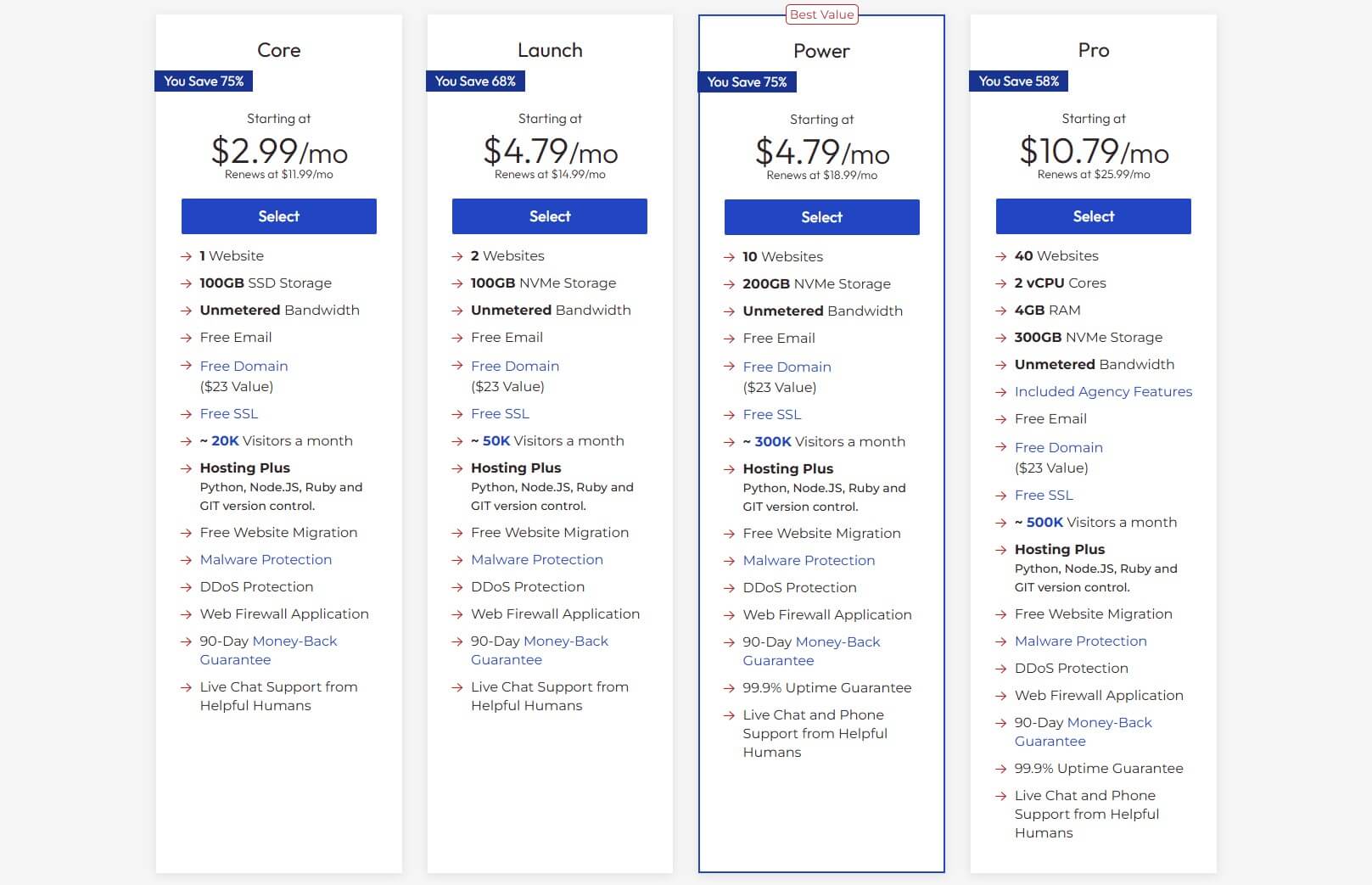
Here is the price range of each hosting type:
- Shared: $2.99 to $10.79 per month
- VPS: $14.99 to $49.99 monthly
- Dedicated server: $124.99 to $339.99 per month
InMotion offers a 90-day money-back guarantee on its yearly shared hosting plans, although other packages offer only a 30-day guarantee.
Performance and Security
InMotion has a special hosting environment, which it refers to as UltraStack. The host claims that this setup or configuration improves the performance of your website up to 40 times better than normal sites. So, we decided to test this.
Our speed tests using GTmetrix revealed that the entry-level plan (Core) or server can deliver a site that loads within 530 ms. Since this server has only 2 times UltraStack speed & performance, it means that InMotion’s more powerful servers can load faster than this one.
Now, imagine how fast the server with 40 times UltraStack speed & performance is! The web host also uses caching technologies, fast NVMe SSDs, and multiple data centers to optimize your site and improve its speed.
Regarding security, InMotion provides free SSL certificates, hack and malware protection, and DDoS protection. However, it does not provide free automated backups unless you purchase the Backup Manager add-on. Nevertheless, you can use the backup manager on cPanel to create and restore manual backup copies.
Supported technologies
When you purchase any hosting type, except shared, InMotion lets you choose your favorite between Debian, CentOS, and Ubuntu Linux operating systems. On shared, InMotion uses CentOS as the primary Linux operating system.
Additionally, the host supports Python, PHP, Node.js, Ruby, and GIT version control. It also uses cPanel, which allows you to install many supported programs on your server.
Find out more in our full InMotion Hosting review.
4. Hosting.com – Best Linux Web Hosting Service for Speed

Hosting.com is an excellent choice if you’re looking for a Linux web hosting provider in 2025. The web host is best known for its unrivaled speed and performance, but it is not the most affordable. Thus, its value for money is debatable.
Hosting.com provides shared, VPS, and dedicated server hosting, but it has many packages under each category, so it offers great scalability. However, the host is a bit of an upsell from any angle.
All hosting types and most packages are divided mainly into a few categories. Some use normal/standard servers while others are configured with Turbo servers, which are supposed to be 20 times faster. So, their prices and configurations differ.
Additionally, the unmanaged servers do not have a control panel but only root access, while their managed versions have cPanel integration.
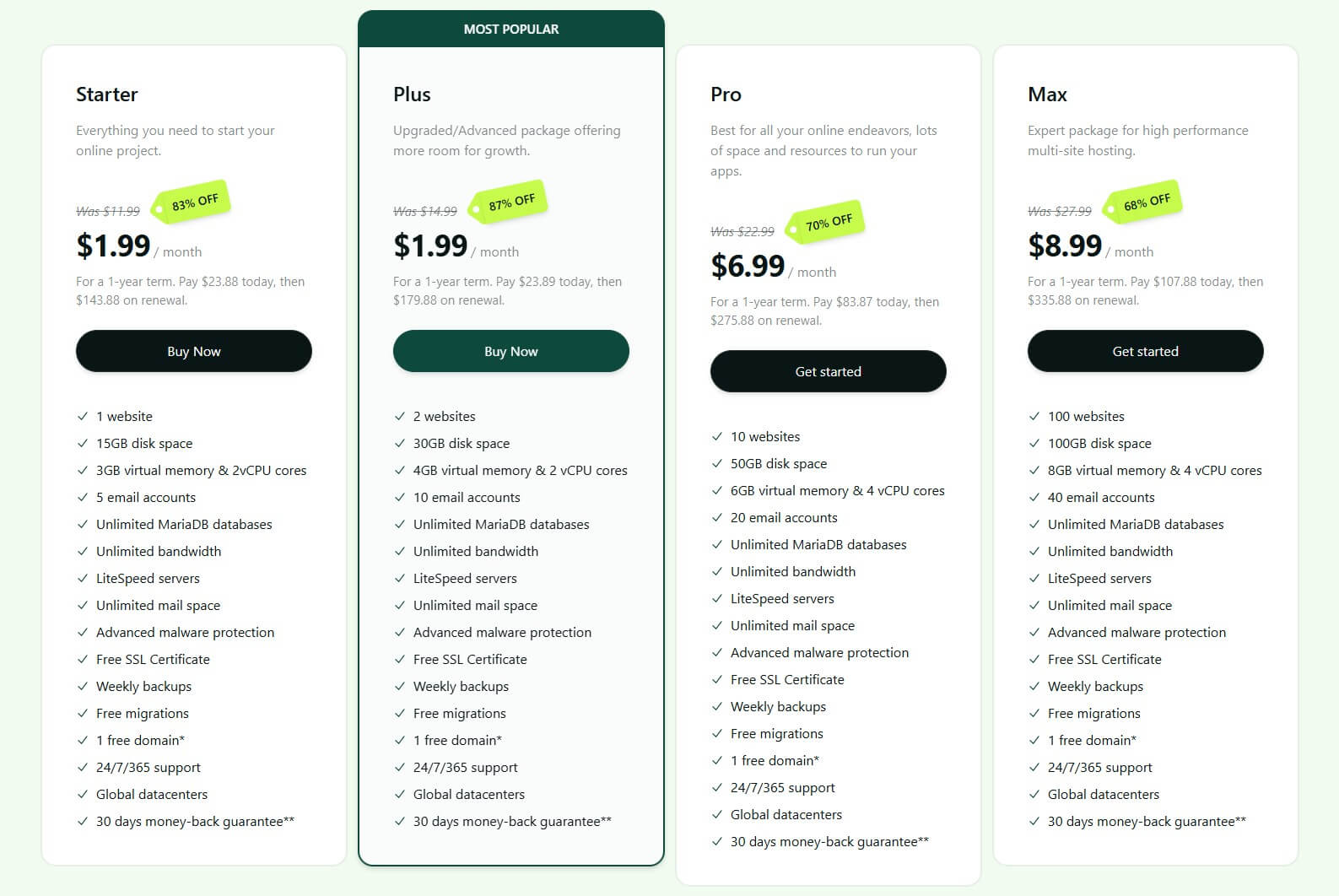
Here is the price range of each Linux hosting type available on InMotion:
- Shared: $1.99 to $8.99 monthly; renews at $11.99 to $27.99 monthly.
- VPS: $9.99 to $79.99 monthly; renews at $19.99 to $159.99 monthly.
- Managed VPS: $38 to $60.50 monthly; renews at $75.99 to $120.99 monthly.
- Dedicated server: contact Hosting.com for a price offer.
Performance & Security
Our findings show that Hosting.com is worthy of being one of the best hosts for Linux services in 2025. It speeds up your website using NVMe SSD, fast LiteSpeed web servers, advanced caching technologies like HTTP/3, multi-core processors, etc., and multiple data centers that allow you to choose the closest location to your audience and deliver the fastest loading speeds.
Hosting.com boasts that its Turbo servers give better speeds than the standard versions. In addition, it has a feature called A2 Optimized, which lets you install popular CMS like WordPress, Joomla, Drupal, etc., on your website in an optimized hosting environment for improved performance.
Therefore, we tested the performance of one of its Turbo servers to confirm the claims.
Our tests revealed that Hosting.com’s servers can deliver a loading speed of 418 ms, and the average response time for 1,000 visitors in one minute was 257 ms. So, even though the server is fast, there is a concern about whether it can withstand a heavy-traffic website.
That said, Hosting.com is very good at security and provides all the features for free. You will enjoy free SSL certificates, automated backups, reboot-less updates, firewalls, brute force protection, DDoS protection, and a virus scanner.
Supported Technologies
Hosting.com’s servers use CentOS, Debian, Ubuntu, Fedora, and CloudLinux. It isolates each user on the servers using CloudLinux on its shared hosting plans. This ensures that each user does not use more resources than the ones allocated to them, and doesn’t affect others.
Other Linux operating systems are available on VPS and dedicated server hosting, and you can choose which one to install. Hosting.com supports MySQL & PostgreSQL databases, Python, Ruby, Node.js, PHP, phpMyAdmin, and phpPgAdmin.
5. DreamHost – Top Linux Web Hosting for WordPress Websites

The last host on our list is DreamHost. It is a straightforward web host that focuses on hosting WordPress websites. Even though it supports other CMS, installing them on your website via the DreamHost Panel is not very straightforward, especially because the cPanel is absent.
DreamHost doesn’t offer many features, but it has what it takes to host a good website. The company provides Linux services in shared, VPS, dedicated, and cloud hosting types.
DreamHost is affordable for shared, cloud, and VPS hosting, but costly for dedicated server hosting with no justifiable features or improvements. So, if you have a WordPress website that needs affordable hosting, DreamHost is a good choice.
You can even try its DreamPress packages if you have a sizable budget.
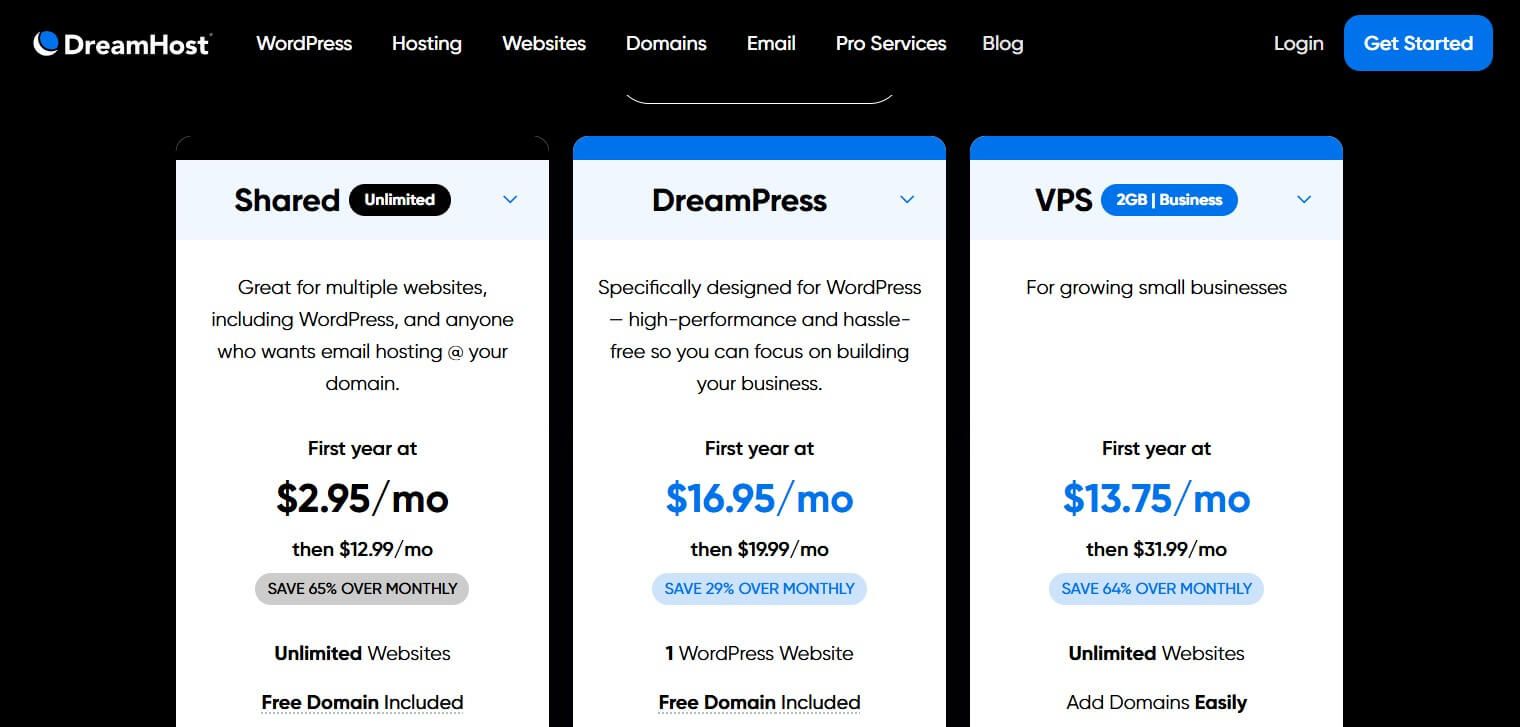
Here is the pricing range of some DreamHost hosting plans on Linux OS:
- Shared: $2.59 to $3.95 monthly; renews between $5.99 and $10.99 monthly
- DreamPress: $16.95 to $71.95 monthly; renews between $19.99 and $74.99 monthly
- VPS: $10 to $60 monthly; renews between $24.99 and $114.99 monthly
- Cloud: $0.0075 to $0.08 per hour, or ~$4.50 to $48 monthly
- Dedicated server: $165 to $625 monthly
Some standard features on the plans include DDoS protection, free email hosting, free WordPress site migrations with a plugin, unlimited bandwidth, and a free website builder. DreamHost offers up to a 97-day money-back guarantee.
Performance & Security
Our research shows that DreamHost has a highly optimized hosting environment with advanced in-built caching. It also tuned its Apache and Nginx servers using the top optimization technologies. However, due to the limitations of the servers, there are some hiccups in its performance.
Our speed tests indicated that DreamHost servers can deliver a website loading speed of 482 ms, which is fast. Nonetheless, its servers failed our load and response tests as we recorded an average response time of 7,230 ms and a 51.4% error rate. So, using the DreamPress servers for a traffic-heavy site is not advisable.
DreamHost provides DDoS protection (even on dedicated servers), free SSL certificates, automated backups, SSH access, and automated WordPress software or Core updates for site or server security.
Supported Technologies
DreamHost uses Ubuntu and Debian for its Linux web hosting services. It also supports MongoDB, Redis, Node.js, Ruby, Python, MySQL, and FTP.
Bottom Line: What is the Best Linux Web Hosting Service?
The best Linux web hosting provider is Hostinger when affordability, security, performance, ease of management, and customer service are needed in balance. If your business’s main needs are security, ease of use, and performance, SiteGround is the right choice.
InMotion Hosting is perfect for a media-heavy site that needs top performance. At the same time, Hosting.com is great for any website that needs top speed, including photography websites, portfolios, large business platforms, and more.
FAQs on Linux Web Hosting Services
Is Linux Web Hosting Good?
Linux web hosting is the best and also the most common way to host websites and web applications nowadays. The operating system helps to create servers that are reliable, secure, easy to manage, affordable, and fully compatible with many leading technologies and software.
So, it makes it possible to use it for any sort of project you may have at hand.
How Much Does Linux Web Hosting Cost?
There is no exact pricing for Linux web hosting since it all depends on the type you choose. However, judging from the pricing of the best web hosting providers, you can expect to get a Linux server for as low as $2 per month and as high as $2,000+ per month.
Anything lower or higher can be a red flag. Yet, it is important to compare the pricing of any host with the features it provides as well.
Is There Free Linux Hosting?
Yes, the best free web hosting services are primarily based on Linux. Using any of them will instantly give you access to a Linux server. Despite that, free options lack customization and other features found in premium hosting solutions, which is why we rarely, if ever, recommend them.
